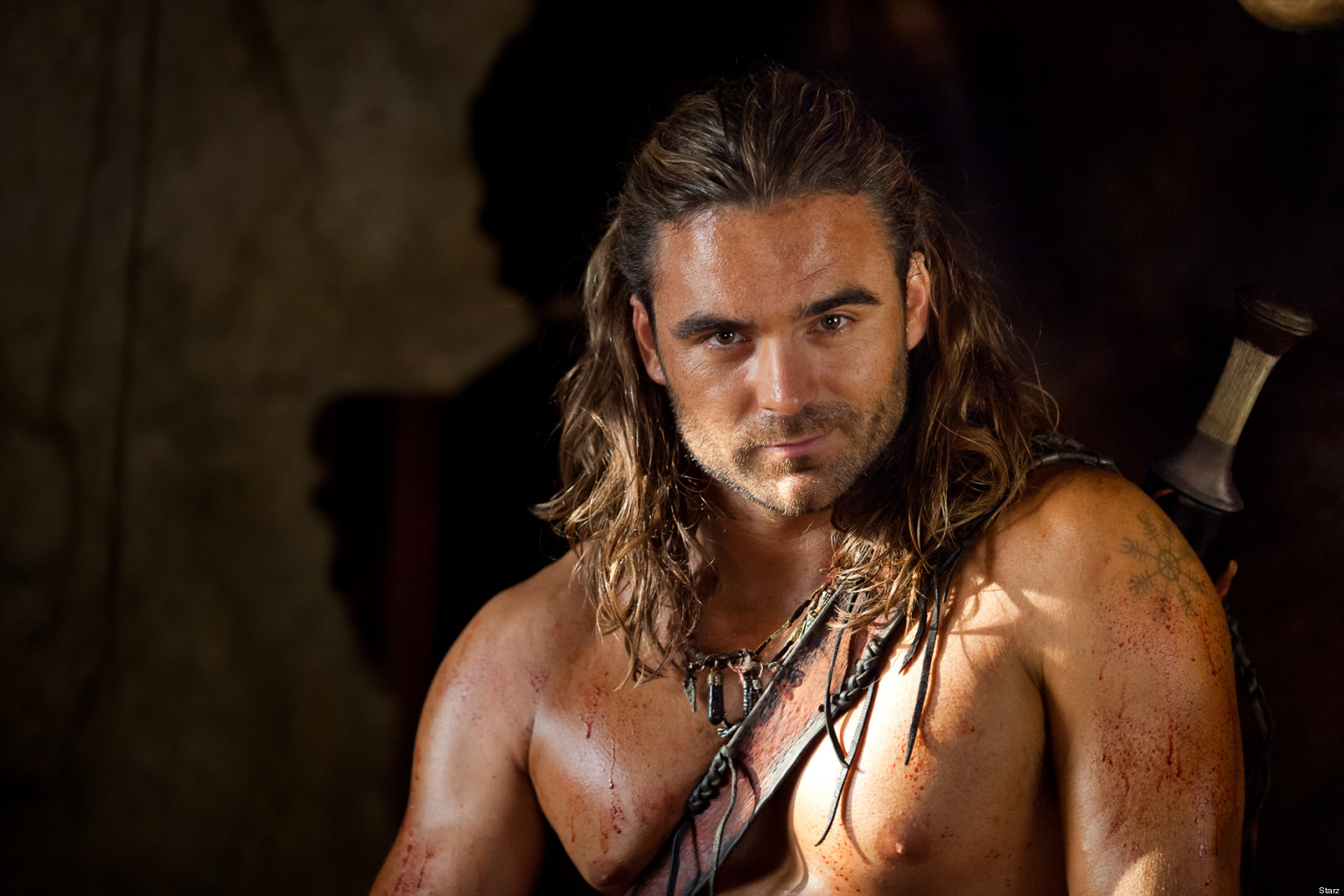Ever wondered who the most compelling figure was within the brutal world of Spartacus? Gannicus, the Celtic gladiator, stands as a testament to unwavering freedom and a thirst for life, becoming one of the most beloved characters in the Spartacus saga. His journey from a slave of Lentulus Batiatus to a champion in the arena and ultimately a key general in the rebellion is a story of courage, skill, and a complicated relationship with the very freedom he seeks.
Gannicus, portrayed by Dustin Clare, is a central figure throughout the Spartacus television series, appearing prominently in the prequel Gods of the Arena and continuing through the subsequent seasons. His character embodies a unique blend of lethal combat prowess and a devil-may-care attitude toward life. As a Gallic gladiator under the ownership of Lentulus Batiatus, Gannicus quickly rises through the ranks, demonstrating unmatched skill with dual swords and a fearless approach to combat. He is the first gladiator of Batiatus to achieve the title of champion of Capua. His journey is not just one of physical strength but also of moral complexity, as he grapples with his role in a system built on slavery and violence.
| Attribute | Information |
|---|---|
| Name | Gannicus (portrayed by Dustin Clare) |
| Origin | Gaul (Celtic) |
| Occupation | Gladiator, Rebel Leader |
| Master | Lentulus Batiatus (formerly) |
| Series Appearances | Spartacus: Gods of the Arena, Spartacus: Vengeance, Spartacus: War of the Damned |
| Key Traits | Exceptional swordsman, Fearless, Charismatic, Independent, Seeks freedom |
| Alliances | Spartacus, Oenomaus, Crixus, Agron, Sibyl |
| Historical Context | Based loosely on historical accounts of the Third Servile War |
| Actor | Dustin Clare |
| Reference | Starz Official Website |
The prequel series, Gods of the Arena, delves into Gannicus's early days in Batiatus's ludus, exploring his relationships with key figures like Oenomaus (Doctore) and the treacherous dynamics within the House of Batiatus. This prequel is chronologically the second season of release, following Blood and Sand. Gannicus's time in the arena is marked by his unmatched skill and strategic thinking, quickly gaining him fame and respect, showcasing the raw brutality and political machinations of gladiatorial combat. Its during this period that Gannicus truly begins to define himself, both as a warrior and as an individual struggling against the constraints of his enslaved existence.
- Spicy Indian Web Series Adult Entertainment Whats Hot Now
- Who Are Storm Reids Parents Family Career Support
Upon earning his freedom after the Games of the New Arena, Gannicus departs from Batiatuss service. However, his separation from the arena is short-lived. He returns later, initially as a somewhat detached acquaintance to the burgeoning rebel cause led by Spartacus. Initially critical of their methods and aims, Gannicus is eventually drawn into the fight against Roman oppression, recognizing the necessity of their rebellion. Clare has spoken about Gannicus's transition from a lone wolf to an integral part of the rebel ensemble. This transformation underscores his growth, evolving from a self-centered gladiator to a leader committed to a cause larger than himself. He sees the value in their struggle and ultimately pledges his sword to Spartacus.
His return to the main narrative occurs in Spartacus: Vengeance and continues into Spartacus: War of the Damned. These seasons see Gannicus fully embrace his role as a general in Spartacus's rebellion. He stands alongside Spartacus, Crixus, and Agron, leading the growing army of freed slaves against the might of Rome. Gannicus's tactical acumen and combat skills prove invaluable to the rebels, allowing them to achieve significant victories against seemingly insurmountable odds. The alliance between Spartacus and Gannicus becomes a cornerstone of the rebellion, a bond forged in blood and a shared desire for liberation.
The winter of 71 BC marks a significant turning point in the rebellion. Gannicus, along with Castus, makes the fateful decision to separate from Spartacus, leading a substantial contingent of Celts and Germans approximately 12,300 rebels to a region known as Cantenna. This division within the rebel ranks proves to be a strategic error, weakening their overall force and ultimately contributing to their downfall. The reasons behind this split are complex, ranging from tactical disagreements to diverging visions for the future of the rebellion. Some believe Gannicus sought a more defensible position, while others suggest internal rivalries played a role. Regardless of the precise motivations, this separation has devastating consequences for the rebels.
The decision to break away ultimately leads Gannicus and his followers into a direct confrontation with the forces of Marcus Crassus. Crassus, a wealthy and ambitious Roman general, is determined to crush the slave rebellion and restore order to the Republic. Forced into battle, Gannicus and his forces face a superior Roman army. Despite their valiant efforts, the rebels are overwhelmed and defeated. The battle is a brutal and bloody affair, with heavy losses on both sides. Gannicus, ever the fierce warrior, fights with unwavering courage, but even his skill is no match for the overwhelming Roman numbers and superior military organization.
Before the events of the war, Spartacus, Agron, and Lucius are seen in the port city of Neapolis. They were posing as rich Romans seeking to purchase a new shipment of slaves, all hailing from the Germanic tribes of the north. This scene highlights the widespread practice of slavery in Roman society and the lengths to which the rebels are willing to go to disrupt the slave trade and recruit new members to their cause. Neapolis, a bustling port city, serves as a hub for the slave trade, connecting various regions of the Roman Empire. The presence of Spartacus and his companions in this environment underscores the pervasive nature of slavery and the economic motivations behind it.
Beyond his combat skills and military leadership, Gannicus's character is defined by his complex relationships and personal struggles. He is a man of intense passion, driven by a thirst for the fleeting pleasures of life wine, women, and camaraderie. His relationship with Melitta, the wife of Oenomaus, is a particularly poignant example of the emotional entanglements within the gladiatorial world. Melitta, a servant in Batiatus's ludus, is a woman of dignity and strength, caught in a difficult situation. The illicit affair between Gannicus and Melitta adds another layer of complexity to their lives and highlights the forbidden desires and emotional tensions that simmer beneath the surface of the ludus.
Another significant relationship is with Sibyl, a young Greek slave rescued by Gannicus and the rebels in War of the Damned. Sibyl represents innocence and vulnerability in a world of violence and brutality. Gannicus becomes her protector and confidant, offering her a glimpse of affection and hope amidst the chaos of the rebellion. Their bond is one of mutual respect and understanding, forged in the crucible of war. Sibyl's unwavering faith in Gannicus provides him with a sense of purpose and helps him to grapple with the moral implications of his actions.
The character of Gannicus has resonated with audiences due to his multifaceted personality and compelling arc. He is not simply a warrior; he is a man grappling with his own demons, seeking meaning in a world of violence and oppression. Dustin Clare's portrayal of Gannicus has been widely praised for its depth and nuance, capturing the character's raw intensity and vulnerability. Clare's performance brings Gannicus to life, making him a relatable and sympathetic figure despite his flaws. He embodies the spirit of rebellion and the struggle for freedom, making him one of the most enduring characters in the Spartacus series. The actor brought both physical presence and emotional depth to the role, winning acclaim for his portrayal of the complex gladiator.
Despite his eventual defeat and capture, Gannicus's legacy endures as a symbol of resistance and the unwavering pursuit of freedom. His story serves as a reminder of the human cost of slavery and the enduring power of the human spirit to fight against oppression. Although the historical details of Gannicus's life remain scarce, the Spartacus series has immortalized him as a legendary figure in the struggle against Roman tyranny. His character embodies the values of courage, loyalty, and the pursuit of a better world, inspiring audiences to this day. Gannicus is more than just a gladiator; he is a symbol of hope in a world shrouded in darkness.
- Your Guide To Flyertalk Miles Points And Travel Secrets Unveiled
- Toni Kroos The Legend Retirement Footballing Achievements


